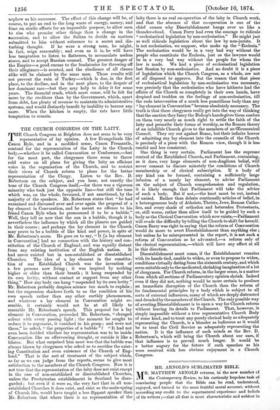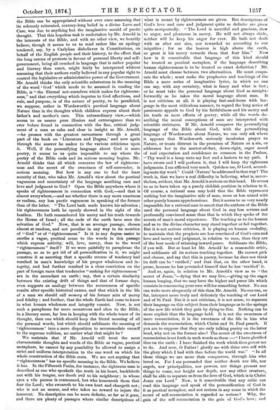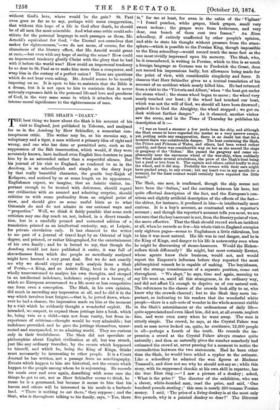MR. ARNOLD'S SUBLIMATED BIBLE.
NIR. MATTHEW ARNOLD returns, in the new number of the Contemporary Review, to his curiously hopeless task of convincing people that the Bible can be read, understood, enjoyed, and turned to the most fruitful moral account, without according any credit to the supernatural experience and beliefs of its writers ;—that all that is most characteristic and noblest in
the Bible can be appropriated without ever once assuming that its solemnly reiterated, century-long belief in a divine Love and Care, was due to anything but the imaginative mould of poetic thought. That this hopeless task is undertaken by Mr. Arnold in the interests of the Bible, and with no other view, we heartily believe, though it seems to us to read rather like an apology tendered, say, by a Carlylian disbeliever in Constitutions, on behalf of the English people and their history, to the effect that the long cat,ena of protests in favour of personal liberty and self- government, being all couched in language that is rather popular and literary than exact, might fairly be interpreted without assuming that their authors really believed in any popular right to control the legislative or administrative power of the Government. Mr. Arnold thinks the only scientific substratum in the meaning of the word 'God' which needs to be assumed in reading the Bible, is "the Eternal not-ourselves which makes for righteous- ness," and that everything which imputes to God affections, and rule, and purpose, is of the nature of poetry, to be paralleled, we suppose, rather in Wordsworth's poetical language about Nature than in the thoughts which children express about their father's and mother's care. This extraordinary view,—which seems to us nearer pure illusion and extravagance than we ever before found in connection with the fine, critical judg- ment of a man as calm and clear in insight as Mr. Arnold, —he presses with the greatest earnestness through a great part of the book on 'Literature and Dogma,' and now again through the answer he makes to the various criticisms upon it. Well, if the personifying language about God is mere poetry, it seems to us quite impossible to say where the poetry of the Bible ends and its serious meaning begins. Mr. Arnold thinks that all which concerns the law of righteous- ness and the secret of the sweetness of self-surrender, is serious meaning. But how is any one to feel the least security of that, who takes Mr. Arnold's view about the poetical vagueness and uncertainty of the language ascribing care and love and judgment to God ? Open the Bible anywhere where it speaks of righteousness in connection with God,—and that is almost everywhere,—and see whether there is any more exactness or realism, any less poetic vagueness in speaking of the former than of the latter. "The Lord hath made known his salvation ; his righteousness hath he openly showed in the sight of the heathen. He hath remembered his mercy and his truth towards the Home of Israel ; all the ends of the earth have seen the salvation of God." Now, that is an average passage, chosen almost at random, and not peculiar in any way in its mention of "God" or of "righteousness." Is it in any degree easier to ascribe a vague, poetical sense to the words in this passage which express activity; will, love, mercy, than to the word "righteousness" itself? If we were painfully to paraphrase the passage, so as to get rid of all personification in it, we might construe it as asserting that a specific stream of tendency had resulted in man's knowledge of his proper wholeness and in- tegrity, and had further resulted in a clear conviction on the part of foreign races that tendencies "making for righteousness" are in the ascendant on earth ; nay, that a certain similarity between the existing drift of things and that of former days, even suggests an analogy between the recurrences of specific results after specific historical causes, and that which in the life of a man we should call memory of his former acts of mercy and fidelity ; and further, that the whole Earth had come to know in what human wholeness and integrity consist. Now, is not such a paraphrase far more monstrous and alien to the Bible, in a literary sense, far less in keeping with the whole tenor of its thought, than one which should keep the literal meaning of all the personal words, but which should sublimate the meaning of righteousness' into a mere disposition to accommodate oneself to the supreme volition, no matter what that might be ?
We maintain that if Mr. Arnold will treat the most .characteristic thoughts and words of the Bible as vague, poetical metaphors, he cannot by any possibility be allowed to assign a strict and uniform interpretation to the one word on which his whole construction of the Bible rests. We are not arguing that " righteousness " has no specific meaning in the Bible. We believe it has. In the Fifteenth Psalm, for instance, the righteous man is described as one who speaketh the-truth in his heart, backbiteth not with his tongue, nor doeth evil to his neighbour ; in whose eyes a vile person is contemned, but who honoureth them that fear the Lord ; who sweareth to his own hurt and changeth not; who is not an usurer, and who takes no reward to injure the innocent. No description can be more definite, so far as it goes, and there are plenty of passages where similar descriptions of
what is meant by righteousness are given. But descriptions of God's love and care and judgment quite as definite are given quite as repeatedly. "The Lord is merciful and gracious, slow to anger, and plenteous in mercy. He will not always chide, neither will he keep his anger for ever. He hath not dealt with WI after our sins, nor rewarded us according to our iniquities ; for as the heaven is high above the earth, so great is his mercy towards them that fear him." Now how is it conceivable that language of this kind should be treated as poetical metaphor, if the language describing human righteousness is to be treated as exact definition ? Mr. Arnold must choose between two alternatives. He must evapo- rate the whole ; must make the prophecies and teachings of the Bible a mere series of imaginative lyrics, in which no one can say, with any certainty, what is fancy and what is fact ; or he must take the personal language about God as straight- forwardly as he takes the moral language about man. It is not criticism at all, it is playing fast-and-loose with lan- guage in the most ridiculous manner, to regard the long series of passionate appeals to God by his faithfulness and his mercy and his truth as mere efforts of poetry, while all the words de- scribing the moral conceptions of man are interpreted with scientific strictness. If Mr. Arnold compares the personifying language of the Bible about God, with the personifying language of Wordsworth about Nature, we can only ask where it appears that Wordsworth seriously inculcates prayer to Nature, or treats distrust in the promises of Nature as a sin, or addresses her in the matter-of-fact, down-right, eager mood of real expectation and confidence so common in the Psalms, "Thy word is a lamp unto my feet and a lantern to my path. I have sworn and I will perform it, that I will keep thy righteous judgments. I am afflicted very much. Quicken me, 0 Lord, accord- ing unto thy word." Could ' Nature ' be addressed in that way? The truth is, that we have a real difficulty in believing, what is, never- theless, evident, that Mr. Arnold is serious on this head. He seems to us to have taken up a purely childish position in relation to it. Of course, a rational man may hold that the Bible represents nothing but the imaginative side of man, more or less mixed with other purely human apprehensions. But it seems to us very nearly impossible for a rational man to assert that the authors of the Bible used the personal language about God in any less serious and profoundly convinced sense than that in which they spoke of the secrets of man's moral experience. The teaching as to the human and as to the divine character may stand together or fall together. But it is not serious criticism, it is playing on human credulity, to maintain that the prophets are less convinced of God's care and love and mercy and judgment, in relation to man, than they are of the best mode of attaining inward peace. Sublimate the Bible, if you will. But at least let Mr. Arnold be a reasonable critic, and sublimate all its serious teaching together. He cannot pick and choose, and say that this is poetry, because he does not think its drift can be ' verified ;' and that that, on the other hand, is prose, because he has persuaded himself that he has 'verified' it.
And so, again, in relation to Mr. Arnold's view as to "the secret of Jesus,"—dying that we may live,—giving up the eager human longing, that we may have the higher and purer life which consists in renouncing your own will for something better. No one can write more eloquently of this than Mr. Arnold. No one can, so far, interpret more truly and delicately the teaching of our Lord and of St Paul. But it is not criticism, it is not sense, to separate their language on this subject from their language as to the springs of the new life which they gain by dying to this. Nothing can be more explicit than the language held. It is not the sweetness of mere renunciation, it is the sweetness of the life in him who demands the renunciation, which Christ and St. Paul preach. If you are to suppose that they are only talking poetry on the latter head, why not on the former also? The secret of the sweetness of renunciation is set forth in such words as these :—‘, I have glorified thee on the earth : I have finished the work which thou gayest me to do. And now, 0 Father ! glorify me with thine own self with the glory which I had with thee before the world was." "In all these things we are more thath conquerors, through him who loved us. For I am persuaded that neither death nor life, nor angels, nor principalities, nor powers, nor things present nor things to come, nor height nor depth, nor any other creature,. shall be able to separate us from the love of God, which is in Christ Jesus our Lord." Now, is it conceivable that any critic can read this language and speak of the personification of God in it as poetical metaphor, and not serious in any sense in which the secret of self-renunciation is regarded as serious? Why, the gain of the self-renunciation is the gain of God's love ; and
without God's love, where would be the gain? St. Paul even goes so far as to say, perhaps with some exaggeration, that without this hope of a life in God after death, he should be of all men the most miserable. And what sane critic could sub- stitute for the personal language in such passages as these, Mr. Arnold's equivalent for God, "the Eternal not-ourselves that makes for righteousness,"—we do not mean, of course, for the clumsiness of the literary effect, that Mr. Arnold would grant at once,—but even with any hope of saving the sense? How could an impersonal tendency glorify Christ with the glory that he had with it before the world was? How could an impersonal tendency be so dear to St. Paul as to make him more than a conqueror, and wrap him in the ecstasy of a perfect union? These are questions which do not bear even asking. Mr. Arnold seems to be merely imposing on us. It is open to him to_maintain that the Bible is a dream, but it is not open to him to maintain that it never seriously expresses faith in the personal life and love and goodness of God, in the very same sense in which it attaches the most intense moral significance to the righteousness of man.








































 Previous page
Previous page